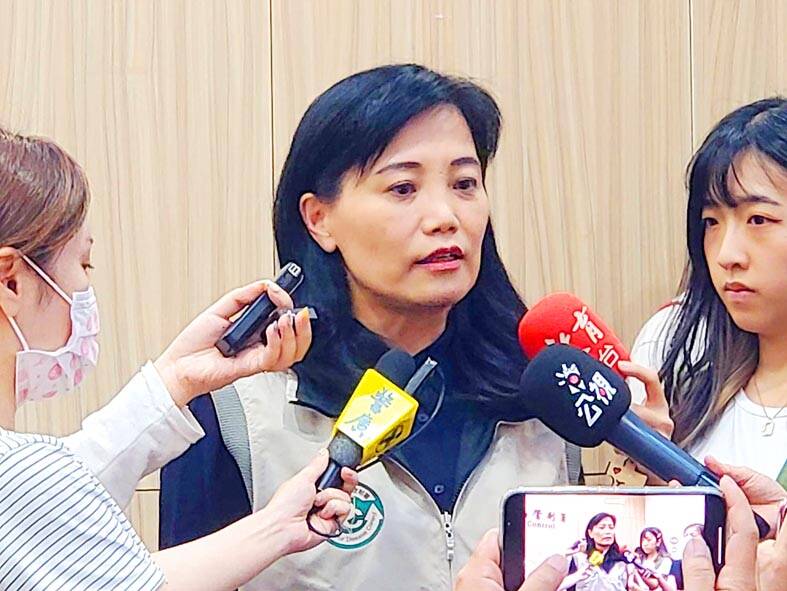The first cluster of measles cases in Taiwan this year has been reported in Taichung, with five confirmed cases and up to 152 people who have been in contact with them, the Centers for Disease and Control (CDC) said yesterday.
The cluster migration originated from a 40-year-old Vietnamese man, whose illness was discovered on Tuesday last week, the centers said.
A separate case was another man who was on the same plane as the Vietnamese man and had interacted with him, the CDC said.

Photo: Lin Hui-chin, Taipei Times
The CDC said it is closely monitoring 28 passengers who had been seated behind the Vietnamese man.
The CDC said it would observe 152 people, who might have come in contact with the five cases, until Jan. 5.
CDC Deputy Director-General Tseng Shu-hui (曾淑惠) said that the centers and the local government’s Department of Health visited the hospital on Tuesday and suggested how the facility could tighten measures to prevent outbreaks.
The measures included a review of hospital records on whether staff have received the measles, mumps and rubella vaccines, and vaccination of those testing negative as soon as possible.
Hospital employees should monitor their health frequently, and the hospital’s end-of-year event should be replaced with educational events on how to control measles infections, the centers said.
The virus can be active and contagious for up to two hours after leaving a person’s body and is transmissible when airborne, Tseng said, adding that a person can infect 18 to 20 others.
Measles outbreaks have been reported in Thailand and Ho Chih Min City, Vietnam, as well as other provinces in southern Vietnam, Tseng said.
People frequently travel to Taiwan from both countries, she said.
The number of measles cases in the Philippines, Malaysia, Indonesia and China has been higher than usual, and outbreaks are still being reported, the centers said, urging people to be careful when traveling abroad.
The CDC said Taiwan has recorded 19 cases of measles this year, all people aged 20 to 40.
Ten cases were local infections, nine were overseas infections and three were infected while on the same plane as other cases, it said.

Taiwan is projected to lose a working-age population of about 6.67 million people in two waves of retirement in the coming years, as the nation confronts accelerating demographic decline and a shortage of younger workers to take their place, the Ministry of the Interior said. Taiwan experienced its largest baby boom between 1958 and 1966, when the population grew by 3.78 million, followed by a second surge of 2.89 million between 1976 and 1982, ministry data showed. In 2023, the first of those baby boom generations — those born in the late 1950s and early 1960s — began to enter retirement, triggering

ECONOMIC BOOST: Should the more than 23 million people eligible for the NT$10,000 handouts spend them the same way as in 2023, GDP could rise 0.5 percent, an official said Universal cash handouts of NT$10,000 (US$330) are to be disbursed late next month at the earliest — including to permanent residents and foreign residents married to Taiwanese — pending legislative approval, the Ministry of Finance said yesterday. The Executive Yuan yesterday approved the Special Act for Strengthening Economic, Social and National Security Resilience in Response to International Circumstances (因應國際情勢強化經濟社會及民生國安韌性特別條例). The NT$550 billion special budget includes NT$236 billion for the cash handouts, plus an additional NT$20 billion set aside as reserve funds, expected to be used to support industries. Handouts might begin one month after the bill is promulgated and would be completed within

The National Development Council (NDC) yesterday unveiled details of new regulations that ease restrictions on foreigners working or living in Taiwan, as part of a bid to attract skilled workers from abroad. The regulations, which could go into effect in the first quarter of next year, stem from amendments to the Act for the Recruitment and Employment of Foreign Professionals (外國專業人才延攬及僱用法) passed by lawmakers on Aug. 29. Students categorized as “overseas compatriots” would be allowed to stay and work in Taiwan in the two years after their graduation without obtaining additional permits, doing away with the evaluation process that is currently required,

RELEASED: Ko emerged from a courthouse before about 700 supporters, describing his year in custody as a period of ‘suffering’ and vowed to ‘not surrender’ Former Taiwan People’s Party (TPP) chairman Ko Wen-je (柯文哲) was released on NT$70 million (US$2.29 million) bail yesterday, bringing an end to his year-long incommunicado detention as he awaits trial on corruption charges. Under the conditions set by the Taipei District Court on Friday, Ko must remain at a registered address, wear a GPS-enabled ankle monitor and is prohibited from leaving the country. He is also barred from contacting codefendants or witnesses. After Ko’s wife, Peggy Chen (陳佩琪), posted bail, Ko was transported from the Taipei Detention Center to the Taipei District Court at 12:20pm, where he was fitted with the tracking